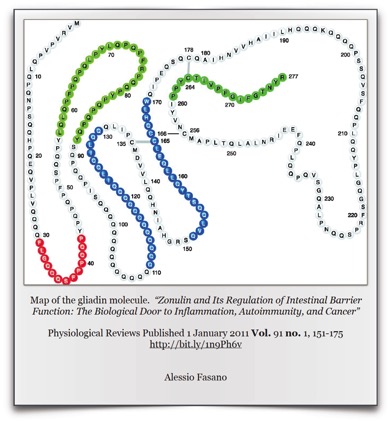The Risks of Cheating
This article originally appeared in our January 2016 newsletter. Due to the [unexpected] overwhelming positive feedback, I decided to improve it and post it here.
I hope you find it helpful.
Stay strong & keep moving forward.
Alan Klapperich
GIG of ECW Branch Manager

While many find it a blessing their condition can be controlled by a "simple diet" change, others consider it a curse of biblical proportions. It's no secret, transitioning to the gluten-free lifestyle can be tough. [Notice the word - lifestyle. The changes required go far beyond just diet.]
A new lifestyle requires the desire to change, knowledge of how to make the change, and the dedication and motivation to stay the course. Yes, it's quite a departure from the previous lifestyle of eating anything from anywhere at anytime.
Barriers to Compliance
When it comes to dietary compliance for the gluten-free diet, there are many barriers that must be broken down:
- Time constraints for cooking or preparing food
- Misinformation
- Lack of knowledge or education (label reading, recognizing gluten)
- Lack of cooking skills
- Ability to manage emotions: depression, anxiety, fear
- Ability to resist temptation
- Feelings of deprivation
- Gluten-Free food availability (may be hard to find)
- Financial restrictions (GF diet can be expensive)
- Social pressures
- Peer pressures
- Travel
- Lack of symptoms
- Effectiveness of the diet (it doesn’t appear to help)
This list seems almost endless, but unfortunately it's still incomplete.
It seems that removing gluten is easier said than done. Give up the foods that you’ve been eating for your entire life? That’s crazy talk!
"I need gluten. I can't live without gluten!"
Ironically, a heroin addict might say something very similar. This is not surprising since narcotics and gluten are addictive. Yes, let’s add "addictive" and "withdrawal symptoms" to the barriers of compliance list.
Addictive? Withdrawal? Seriously?
Yes, yes, and yes. Read on Macduff…

Think of gluten as a string of pearls that must be broken down into individual pearls [known as amino acids].
Humans do not have the enzymes to completely break down gluten into individual amino acids.
Large fragments [known as peptides] of undigested gluten remain after digestion.
Some of those peptides are known as gluteomorphins.
Due to increased intestinal permeability [also known as "Leaky Gut"], the gluteomorphins pass through intestinal wall and enter the blood stream.
Gluteomorphins react with the opiate receptors in the brain, just like heroin and morphine.
This reaction creates a craving - generating the desire for more of the substance.
Julianne Taylor, RN offers up a great explanation on how gluten creates an autoimmune reaction.
http://bit.ly/2vAO4hd or http://bit.ly/2Jgh3ZO
….and now, back to our regularly scheduled article…
Complications of Untreated Celiac Disease
While it may be easy to rationalize away gluten cheats as simple, temporary aches and pains or as minor [major] inconveniences - beneath the surface, your body could be gearing up for a civil war that would put Gettysburg to shame.

A 2015 study published by The Celiac Center at Beth Israel Deaconess Medical Center (BIDMC) found that 75.5% of the study participants had adequate gluten-free diet adherence.
So what about the other one-fourth (24.5%)? They may be setting themselves up for additional [often serious] medical conditions.
Some of the possible complications of cheating:
- Increased risk of heart attacks & stokes
- Increased risk of blood clots & Deep Vein Venous Thrombosis (DVT)
- Heart muscle damage
- Heart rhythm problems
- Coronary Artery Dissection
- Anemia
- Bone loss
- Cancers
- Ulcerative jejunitis
- Collagenous sprue
- Depression
- Malnutrition
- Neurological disorders
- Infertility
- Miscarriage
- Increased risk of triggering additional associated autoimmune conditions
by Linda J. Dobberstein, DC
http://bit.ly/1TDnOnE
7 Serious Complications of Untreated Celiac Disease
by Sarah Patrick
http://bit.ly/1OyRQZE
Complications of Untreated Non-Celiac Gluten Sensitivity
Think you can escape the risks because you have non celiac gluten sensitivity? Sorry, gluten can still rear its ugly head with the likes of:
- Eczema
- Psoriasis
- Depression
- Peripheral Neuropathy
- ADHD
- Multiple Sclerosis
- Ataxia
- Diabetes
- Amyotrophic Lateral Sclerosis (Lou Gerhig's Disease)
- and potentially much more
To learn more about the above list, please check out this link:
by Chris Kresser, M.S., L.Ac
http://bit.ly/1n5wysf
ChChChChanges in Behavior
"Change is not measured in leaps and bounds but in the small steps we take toward a larger goal." ~Claire Dorotik-Nana LMFT
The Barriers to Compliance list above consists of things we can control and things we cannot control. Fear not, this lack of control does not a victim make.
The good news - we get to choose how we react in those situations; if we don't like it - we can change it.
The bad news - change is not always easy and requires effort.
The links below offer some information on how to make the changes that can lead to healthier, happier lives.
The Stages of Change
by Kendra Cherry
http://abt.cm/1ZxH2wA
"Understanding the elements of change, the stages of change, and ways to work through each stage can help you achieve your goals"
5 Steps to Changing Any Behavior
by Alex Lickerman, MD
http://bit.ly/1PCurD7
"Always remember: none of us was born with any habits at all. They were all learned, and can all, therefore, be unlearned. The question is: how badly do you really want to change?"
NursingTimes.net Vol 107 No 23 06/11/2014 - "Healthier lifestyles: behaviour change"
by Nicola Davies
http://bit.ly/1JPubUJ
"Unhealthy lifestyle choices such as smoking and poor diet are significant and preventable causes of long-term conditions. Nurses are well placed to encourage and support patients to make healthy choices. Through good communication, collaboration and goal-setting, behaviour change is possible. This article discusses evidence for the best ways to initiate and sustain behaviour change."
How to Withstand Food Peer Pressure
by Karen Diaz, RD
http://huff.to/1OMFmKx
When you are trying to listen to your body, food peer pressure can be the last straw making you throw in the towel. Here are four important ways to withstand food peer pressure.